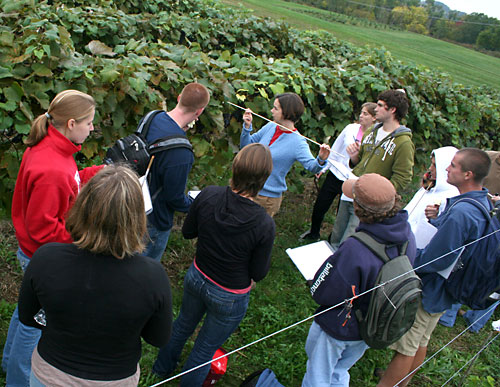
The Northeast Region of USDA’s Sustainable Agriculture Research and Education Program (SARE) has awarded $178,311 to a team of researchers, extension staff, and wine-grape growers to assess the economic and environmental benefits of canopy management in aromatic white wine grapes such as Riesling.
Canopy management is a suite of practices that can help New York growers reduce fungicide use and improve grape flavor. “The difference in the wines can be like night and day,” says Justine Vanden Heuvel an assistant professor in both the Department of Horticulture in Ithaca and the Department of Horticultural Sciences at the New York State Agricultural Experiment Station, Geneva.
Vanden Heuvel, the project’s principal investigator, adds that a big part of the project will be to determine how much more consumers are willing to pay for the wines to offset the extra expense of the canopy management.
Unlike in the arid west, where vine growth is limited by scant moisture, grape vines in the Northeast run rampant, fueled by our better soils and more-than-adequate rainfall. But the rank growth holds moisture – encouraging disease – and shades the clusters – which need sun to develop the nuanced flavors that command higher prices when made into wine.
By thinning shoots in May and removing leaves in the fruiting zone to expose clusters to sun after the fruit has set, most growers should be able to reduce fungicide use and improve the flavor and aroma profiles of their wine, hopefully increasing the price their wine can be sold for. ”In 2008, we saw much less botrytis in vineyards where growers used canopy management,” notes Vanden Heuvel.
Vanden Heuvel’s team will be working with six growers, harvesting grapes from test plots with and without canopy management and making them in to wine at Cornell’s Vinification and Brewing Technology Laboratory in Geneva. The wines will be used in consumer preference studies, and a full economic analysis will determine the profitability of canopy management practices.
“We can tell growers that they’ll have less disease and that their grapes will have better flavors and aromas with canopy management. But if they can’t sell the wine for more, there is little incentive to adopt these practices,” observes Vanden Heuvel.


